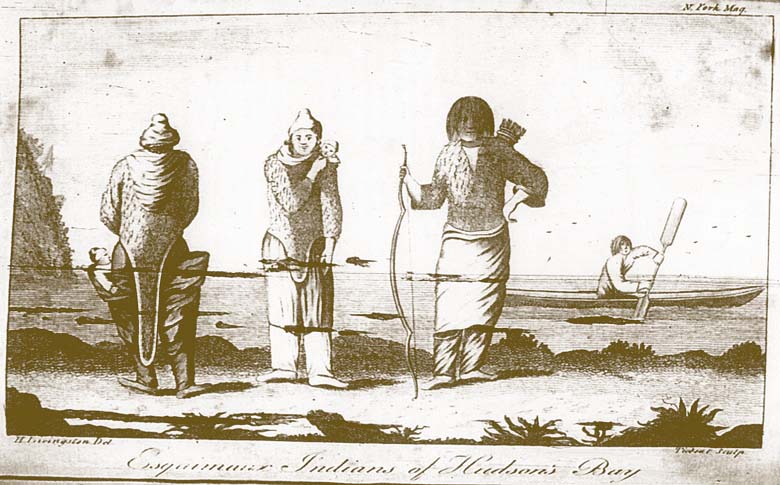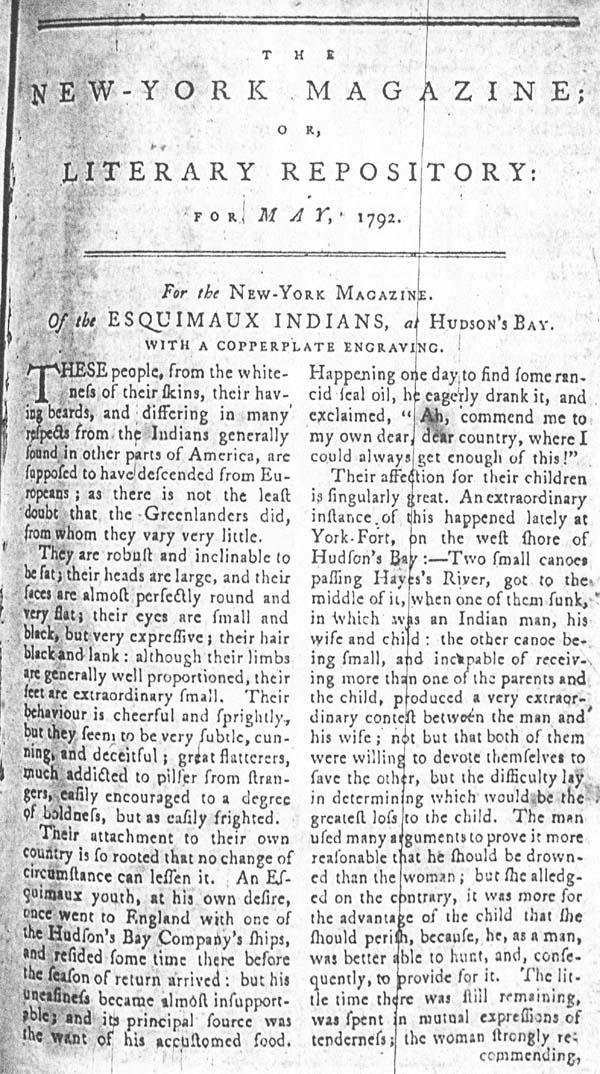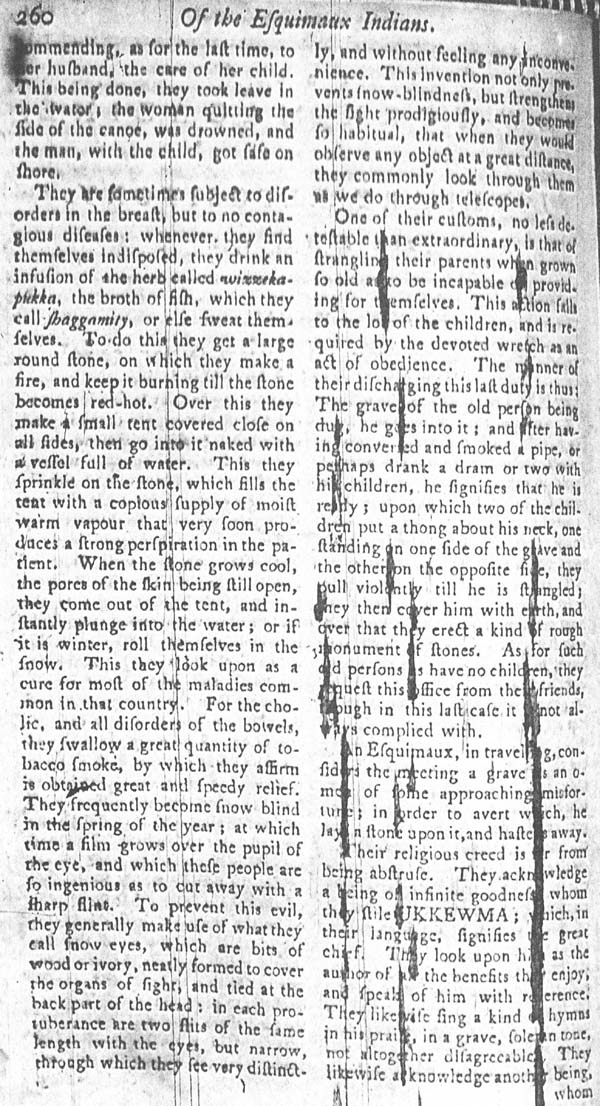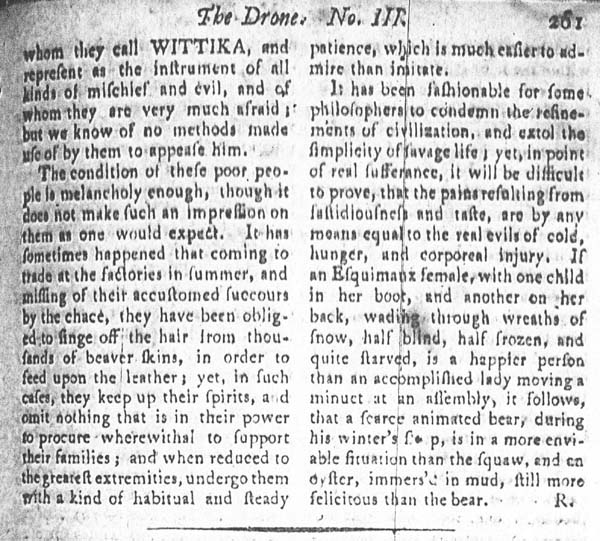|
For the New-York Magazine.
Of the ESQUIMAUX INDIANS, at Hudson's Bay.
WITH A COPPERPLATE ENGRAVING.
THESE people, from the whiteness of their skins, their having beards, and differing in many respects from the Indians generally found in other parts of America, are supposed to have descended from Europeans; as there is not the least doubt that the Greenlanders did, from whom they vary very little.
They are robust and inclinable to be fat; their heads are large, and their faces are almost perfectly round and very flat; their eyes are small and black, but very expressive; their hair black and lank: although their limbs are generally well proportioned, their feet are extraordinary small. Their behavior is cheerful and sprightly, but they seem to be very subtle, cunning, and deceitful; great flatterers, much addicted to pilfer from strangers, easily encouraged to a degree of boldness, but as easily frighted.
Their attachment to their own country is so rooted that no change of circumstance can lessen it. An Esquimaux youth, at his own dsire, once went to England with one of the Hudson's Bay Company's ships, and resided some time there before the season of return arrived: but his uneasiness became almost insupportable; and its principle source was the want of his accustomed food. Happening one day to find some rancid seal oil, he eagerly drank it, and exclaimed, "Ah, commend me to my own dear, dear country, where I could always get enough of this!"
Their affection for their children is singularly great. An extraordinary instance of this happened lately at York Fort, on the west shore of Hudson's Bay: -- Two small canoes passing Hayes's River, got to the middle of it, when one of them sunk, in which was an Indian man, his wife and child: the other canoe being small, and incapable of receiving more than one of the parents and the child, produced a very extraordinary contest between the man and his wife; not but that both of them were willing to devote themselves to save the other, but the difficulty lay in determining which would be the greatest loss to the child. The man used many arguments to prove it more reasonable that he should be drowned than the woman; but she alleged on the contrary, it was for the advantage of the child that she should perish, because, he, as a man, was better able to hunt, and, consequently, to provide for it. The little time there was still remaining, was spent in mutual expressions of tenderness; the woman strongly
recommending, as for the last time, to her husband, the care of her child. This being done, they took leave in the water; the woman quitting the side of the canoe, was drowned, and the man, with the child, got safe on shore.
They are sometimes subject to disorders in the breast, but to no contagious diseases: whenever they find themselves indisposed, they drink an infusion of the herb called wizzekkapukka, the broth of fish, which they call shaggamity, or else sweat themselves. To do this they get a large round stone, on which they make a fire, and keep it burning till the stone becomes red-hot. Over this they make a small tent covered close on all sides, then go into it naked with a vessel full of water. This they sprinkle on the stone, which fills the tent with a copious supply of moist warm vapour that very soon produces a strong perspiration in the patient. When the stone grows cool, the pores of the skin being still open, they come out of the tent, and instantly plunge into the water; or if it is winter, roll themselves in the snow. This they look upon as a cure for most of the maladies common in that country. For the cholic, and all disorders of the bowels, they swallow a great quantity of tobacco smoke, by which they affirm is obtained great and speedy relief. They frequently become snow blind in the spring of the year; at which time a film grows over the pupil of the eye, and which these people are so ingenious as to cut away with a sharp flint. To prevent this evil, they generally make sure of what they call snow eyes, which are bits of wood or ivory, neatly formed to cover the organs of sight, and tied at the back part of the head: in each protuberance are two slits of the same length with the eyes, but narrow, through which they see very distinctly, and without feeling any inconvenience. This invention not only prevents snow-blindness, but strengthens the sight prodigiously, and becomes so habitual, that when they would observe any object at a great distance, they commonly look through them as we do through telescopes.
One of their customs, no less detestable than extraordinary, is that of strangling their parents when grown so old as to be incapable of providing for themseves. This action falls to the lot of the children, and is required by the devoted wretch as an act of obedience. The manner of their discharging this last duty is thus: The grave of the old person being dug, he goes into it; and after having conversed and smoked a pipe, or perhaps drank a dram or two with his children, he signifies that he is ready; upon which two of hte children put a thong around his neck, one standing on one side of the grave and the other on the opposite side, they pull violently until he is strangled; they then cover him with earth, and over that they erect a kind of rough monument of stones. As for such old persons as have no children, they request this office from their friends, though in this last case it is not always complied with.
An Esquimaux, in traveling, considers the meeting a grave as an omen of some approaching misfortune; in order to avert which, he lays a stone upon it, and hastens away.
Their religious creed is far from being abstruse. They acknowledge a being of infinite goodness whom they stile UKKEWMA; which, in their language, signifies the great chief. They look upon him as the author of all the benefits they enjoy, and speak of him with reverence. They likewise sing a kind of hymns in his praise, in a grave, solemn tone, not altogether disagreeable. They likewise acknowledge another
being, whom they call WITTIKA, and represent as the instrument of all kinds of mischief and evil, and of whom they are very much afraid; but we know of no methods made use of by them to appease him.
The condition of these poor people is melancholy enough, though it does not make such an impression on them as one would expect. It has sometimes happened that coming to trade at the factories in summer, and missing of their accustomed succours by the chace, they have been obliged to singe off the hair from thousands of beaver skins, in order to feed upon the leather; yet, in such cases, they keep up their spirits, and omit nothing that is in their power to procure wherewithal to support their families; and when reduced to the greatest extremities, undergo them with a kind of habitual and steady patience, which is much easier to admire than to imitate.
It has been fashionable for some philosophers to condemn the refinements of civilization, and extol the simplicity of save life; yet, in point of real sufferance, it will be difficult to prove, that the pains resulting from fastidiousness and taste, are by any means equal to the real evils of cold, hunger, and corporeal injury. If an Esquimaux female, with one child in her boot, and another on her back, wading through wreaths of snow, half blind, half frozen, and quite starved, is a happier person than an accomplished lady moving a minuet at an assembly, it follows, that a scarce animated bear, during his winter's sleep, is in a more enviable situation than the squaw, and an oyster, immers'd in mud, still more felicitous than the bear.
R.
|







![]() Copyright © 2003, InterMedia Enterprises
Copyright © 2003, InterMedia Enterprises